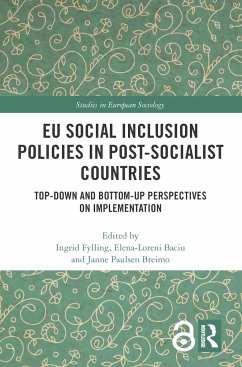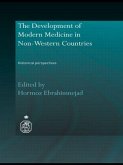EU Social Inclusion Policies in Post-Socialist Countries
Top-Down and Bottom-Up Perspectives on Implementation
Herausgeber: Fylling, Ingrid; Breimo, Janne Paulsen; Baciu, Elena Loreni
EU Social Inclusion Policies in Post-Socialist Countries
Top-Down and Bottom-Up Perspectives on Implementation
Herausgeber: Fylling, Ingrid; Breimo, Janne Paulsen; Baciu, Elena Loreni
- Gebundenes Buch
- Merkliste
- Auf die Merkliste
- Bewerten Bewerten
- Teilen
- Produkt teilen
- Produkterinnerung
- Produkterinnerung
This book explores experiences with inclusion policy implementation in seven different post-socialist EU countries. It focuses particularly on two groups of people in constant danger of social exclusion: People with Roma background and people with disabilities.
Andere Kunden interessierten sich auch für
![Queer Visibility in Post-Socialist Cultures Queer Visibility in Post-Socialist Cultures]() Queer Visibility in Post-Socialist Cultures70,99 €
Queer Visibility in Post-Socialist Cultures70,99 €![Why Did the Socialist System Collapse in Central and Eastern European Countries? Why Did the Socialist System Collapse in Central and Eastern European Countries?]() Jan AdamWhy Did the Socialist System Collapse in Central and Eastern European Countries?75,99 €
Jan AdamWhy Did the Socialist System Collapse in Central and Eastern European Countries?75,99 €![Trade Policies Towards Developing Countries Trade Policies Towards Developing Countries]() Trade Policies Towards Developing Countries112,99 €
Trade Policies Towards Developing Countries112,99 €![Trade Policies Towards Developing Countries Trade Policies Towards Developing Countries]() Ippei YamazawaTrade Policies Towards Developing Countries112,99 €
Ippei YamazawaTrade Policies Towards Developing Countries112,99 €![Why Did the Socialist System Collapse in Central and Eastern European Countries? Why Did the Socialist System Collapse in Central and Eastern European Countries?]() Jan AdamWhy Did the Socialist System Collapse in Central and Eastern European Countries?112,99 €
Jan AdamWhy Did the Socialist System Collapse in Central and Eastern European Countries?112,99 €![The Synchronization of National Policies The Synchronization of National Policies]() Pertti AlasuutariThe Synchronization of National Policies206,99 €
Pertti AlasuutariThe Synchronization of National Policies206,99 €![The Development of Modern Medicine in Non-Western Countries The Development of Modern Medicine in Non-Western Countries]() Hormoz Ebrahimnejad (ed.)The Development of Modern Medicine in Non-Western Countries206,99 €
Hormoz Ebrahimnejad (ed.)The Development of Modern Medicine in Non-Western Countries206,99 €-
-
-
This book explores experiences with inclusion policy implementation in seven different post-socialist EU countries. It focuses particularly on two groups of people in constant danger of social exclusion: People with Roma background and people with disabilities.
Hinweis: Dieser Artikel kann nur an eine deutsche Lieferadresse ausgeliefert werden.
Hinweis: Dieser Artikel kann nur an eine deutsche Lieferadresse ausgeliefert werden.
Produktdetails
- Produktdetails
- Verlag: Routledge
- Seitenzahl: 250
- Erscheinungstermin: 23. Juli 2019
- Englisch
- Abmessung: 240mm x 161mm x 18mm
- Gewicht: 543g
- ISBN-13: 9781138352803
- ISBN-10: 1138352802
- Artikelnr.: 57176086
- Herstellerkennzeichnung
- Libri GmbH
- Europaallee 1
- 36244 Bad Hersfeld
- gpsr@libri.de
- Verlag: Routledge
- Seitenzahl: 250
- Erscheinungstermin: 23. Juli 2019
- Englisch
- Abmessung: 240mm x 161mm x 18mm
- Gewicht: 543g
- ISBN-13: 9781138352803
- ISBN-10: 1138352802
- Artikelnr.: 57176086
- Herstellerkennzeichnung
- Libri GmbH
- Europaallee 1
- 36244 Bad Hersfeld
- gpsr@libri.de
Ingrid Fylling holds a position as associate professor in Sociology at Nord University, Norway. Her main research interest is in disability studies and studies of local welfare services. She is also a board member of the Nordic Network for Disability Research. Latest publication (co-authored): Fylling, I. and Melbøe, L. (2019). Culturalisation, homogenisation, assimilation? Intersectional perspectives on the life experiences for Sami people with disabilities. Accepted for publication in Scandinavian Journal of Disability Research 2019 http://doi.org/10.16993/sjdr.575.. Janne Paulsen Breimo is a professor in social work at the Faculty of Social Sciences, Nord University, Norway. Her research interests include social policy and social welfare. She is the chair of the European Sociological Association's Research Network on the Sociology of Social Policy and Social Welfare (RN26). Co-authored publications: Romanian Roma: An Institutional Ethnography of Labour Market Exclusion (2016), Networking enforced - comparing social services' collaborative rationalesacross different welfare regimes (2016); Planning individually? Spotting international welfare trends in the field of rehabilitation in Norway (2016). Elena-Loreni Baciu is an Associate Professor at the Social Work Department from the West University of Timisoara, Romania and a co-founder of the Research-Action Centre on Discrimination and Social Inclusion at the same University. (Co)-authored publications: Between equality and discrimination: disabled persons in Romania (2017); Exploring the social relations of Roma employability (2016); Romanian Roma: An institutional ethnography of labour market exclusion (2016).
1. Implementing Social Inclusion Policies in Post-socialist EU Countries:
Stumbling Blocks and Stepping Stones. 2. Independent Living in Central and
Eastern Europe? The Challenges of Post-socialist Deinstitutionalization. 3.
The Limits of Projects: Translating the Social Inclusion of Roma in Serbia.
4. Ethnicizing Poverty, Implementation of Structural Funds in Slovakia. 5.
Policies for Whom? Roma as Ethnic and/or National Minorities: The Case of
Hungary and the European Union. 6. How Can We Understand the Poor
Implementation of Disability Inclusion Policy in Romania?. 7. EU Social
Inclusion Policy Implementation in Poland 1989-2018. 8. Social Inclusion
and Political Participation of Persons with Disabilities in Slovakia. 9.
Social Economy Entities as a Practical Instrument to Enhance Social
Inclusion in Poland. 10. The Promotion of Social Inclusion in the Slovak
Education System through "Teach for Slovakia" Programme. 11. The Integrated
Approach in Practice: A Framework for Roma Work Inclusion. Case Studies
from Romania. 12. Inclusion Policies between EU Framework and
Post-socialist Heritage.
Stumbling Blocks and Stepping Stones. 2. Independent Living in Central and
Eastern Europe? The Challenges of Post-socialist Deinstitutionalization. 3.
The Limits of Projects: Translating the Social Inclusion of Roma in Serbia.
4. Ethnicizing Poverty, Implementation of Structural Funds in Slovakia. 5.
Policies for Whom? Roma as Ethnic and/or National Minorities: The Case of
Hungary and the European Union. 6. How Can We Understand the Poor
Implementation of Disability Inclusion Policy in Romania?. 7. EU Social
Inclusion Policy Implementation in Poland 1989-2018. 8. Social Inclusion
and Political Participation of Persons with Disabilities in Slovakia. 9.
Social Economy Entities as a Practical Instrument to Enhance Social
Inclusion in Poland. 10. The Promotion of Social Inclusion in the Slovak
Education System through "Teach for Slovakia" Programme. 11. The Integrated
Approach in Practice: A Framework for Roma Work Inclusion. Case Studies
from Romania. 12. Inclusion Policies between EU Framework and
Post-socialist Heritage.
1. Implementing Social Inclusion Policies in Post-socialist EU Countries:
Stumbling Blocks and Stepping Stones. 2. Independent Living in Central and
Eastern Europe? The Challenges of Post-socialist Deinstitutionalization. 3.
The Limits of Projects: Translating the Social Inclusion of Roma in Serbia.
4. Ethnicizing Poverty, Implementation of Structural Funds in Slovakia. 5.
Policies for Whom? Roma as Ethnic and/or National Minorities: The Case of
Hungary and the European Union. 6. How Can We Understand the Poor
Implementation of Disability Inclusion Policy in Romania?. 7. EU Social
Inclusion Policy Implementation in Poland 1989-2018. 8. Social Inclusion
and Political Participation of Persons with Disabilities in Slovakia. 9.
Social Economy Entities as a Practical Instrument to Enhance Social
Inclusion in Poland. 10. The Promotion of Social Inclusion in the Slovak
Education System through "Teach for Slovakia" Programme. 11. The Integrated
Approach in Practice: A Framework for Roma Work Inclusion. Case Studies
from Romania. 12. Inclusion Policies between EU Framework and
Post-socialist Heritage.
Stumbling Blocks and Stepping Stones. 2. Independent Living in Central and
Eastern Europe? The Challenges of Post-socialist Deinstitutionalization. 3.
The Limits of Projects: Translating the Social Inclusion of Roma in Serbia.
4. Ethnicizing Poverty, Implementation of Structural Funds in Slovakia. 5.
Policies for Whom? Roma as Ethnic and/or National Minorities: The Case of
Hungary and the European Union. 6. How Can We Understand the Poor
Implementation of Disability Inclusion Policy in Romania?. 7. EU Social
Inclusion Policy Implementation in Poland 1989-2018. 8. Social Inclusion
and Political Participation of Persons with Disabilities in Slovakia. 9.
Social Economy Entities as a Practical Instrument to Enhance Social
Inclusion in Poland. 10. The Promotion of Social Inclusion in the Slovak
Education System through "Teach for Slovakia" Programme. 11. The Integrated
Approach in Practice: A Framework for Roma Work Inclusion. Case Studies
from Romania. 12. Inclusion Policies between EU Framework and
Post-socialist Heritage.








